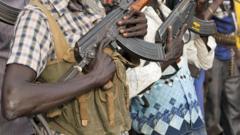Article details the recent rise in violence in South Sudan, including accusations of barrel bomb attacks by the government against the White Army militia, and the implications for regional stability.
Escalating Violence in South Sudan Signals Potential Return to Civil War

Escalating Violence in South Sudan Signals Potential Return to Civil War
United Nations expresses concern as aerial bombardments increase, threatening peace in the region.
The UN has raised alarms regarding the increasing violence in South Sudan, warning that the use of barrel bombs in recent airstrikes could lead the nation back into civil war. Nicholas Haysom, head of the UN mission in South Sudan, highlighted that these attacks have led to significant casualties and severe injuries, particularly burns, among civilians since fighting erupted between the national army and the White Army militia, which supports Vice-President Riek Machar.
This troubling development follows a history of conflict since South Sudan's independence from Sudan, with an estimated 400,000 lives lost during the 2013-2018 civil war. Although a peace deal was signed in 2018, tensions have remained high, exacerbated by the arrest of several of Machar’s allies and increasing ethnic violence. Haysom urged that renewed conflict would annihilate gains achieved under the peace agreement and severely impact both South Sudan and its neighboring countries.
Local officials, including Nasir County Commissioner James Gatluak Lew, have condemned the government’s military actions, alleging the use of chemical bombings. Eyewitness accounts suggest the presence of ethyl acetate, a highly flammable component, at the explosion sites. Despite these claims, government spokesman Michael Makuei asserted that military actions were strictly targeted at the White Army and did not inflict harm on civilians, although Haysom confirmed that an estimated 63,000 residents have been displaced by ongoing violence.
The specter of civil unrest looms larger as South Sudan approaches elections scheduled for the upcoming year, with increasing disinformation and ethnic tensions threatening to erupt further. The UN mission, supported by approximately 18,000 peacekeepers, is currently engaged in diplomatic efforts aiming to prevent a complete return to war.
Adding to the complexity, Vice-President Machar accused Uganda of breaching the UN arms embargo by conducting airstrikes within South Sudan, claiming these actions have resulted in civilian casualties in the Upper Nile region. While the Ugandan government maintains that its military presence in South Sudan is authorized by President Kiir's administration, this claim is denied by the South Sudanese government, leaving the regional situation precarious and fraught with the potential for further conflict.

















